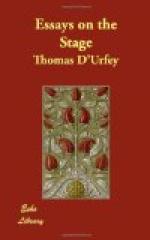To begin then, I shall illustrate my first Scene with a comical hint upon some part of his Character; and that the Jest may be worthy of making you laugh, you are to know, that the first view I ever had of this extraordinary Person, was neither better nor worse than under the Gallows. Well, but think you, I warrant, ’twas about some Charitable Duty that his sacred Function and Piety oblig’d him to, such as Exhorting the poor Souls to confess their Crimes, in order to be sav’d, or the like; no, faith, but quite contrary, for he was rather hardning them, and infusing a strong Portion of his own obstinacy, to fortifie ’em for their dubious Journey; and in few minutes after, possess’d with a stronger Spirit of Priesthood than e’er, for some past Ages there has been Example for, pronounc’d the Absolution, the extremest and most mysterious Grace the Church can possibly give to the most repentant Sinner, to wretches Justly condemn’d by Law to die, for the most horrible Crimes in nature, viz. the intended Murder of the King, and Subversion of the Protestant Religion and Government. Now that such a Person should set up for a Protestant Example, and a Teacher of Morality, is somewhat new, for upon my veracity, this Gentleman may insinuate as he pleases, that our Church, and its Doctrines govern his heart; but as to that matter what may be in his heart I can’t tell, but if a Pope is not crept into his belly, very near it, I am very much mistaken.
Pliny indeed, in his Natural History, Lib. 28, Cap. 10. tells ye, He that is bitten by a Scorpion may have relief, if immediately he go and whisper his grief into the Ear of an Ass. This Historian, perhaps, had so great credit with these Malefactors that they thought the remedy, by Auricular Confession, might serve too in their Concerns. But we are confirm’d, they were enough mistaken in the rest of their Opinions, and so ’tis very likely were in this. If this Parallel be found a little gross, I hope the Reader will excuse it, when he examines the bold Critick’s Stile relating to the Poets. Besides, how wise soever he may be in other things, I’m sure all those that are so, and true Sons of the Church, when they reflect on that Action of his, will own that he deserves that, or a worse Title. And so to proceed.
But before we inspect further, or touch upon the Moralist’s Immorality, for I dare ingage it is not altogether impossible to prove, the Pulpiteer may be tainted a little as well as the Poetaster, let us see whether we can find him guilty of the first Charge against us, which is Immodesty; and upon this subject indeed, if our Learn’d Reformer did not impose upon us with a Fallacy, I should (to shew my good Nature walk hand in hand with my resentment) once more admire him for his Character of Modesty in the 11th page of his Book, which is, to do him Justice, very fine; but then he only tells us of one kind of Modesty, when he knows there are two, and therein he is Falacious, in not exposing the other, which is decency of Speech and Behaviour; and truly, meerly, I believe, through a conscious reflection of his own frequent miscarriages in that case. If therefore, these Papers differ a little from that Civility which is proper, I beg the Readers pardon, and assure him ’tis only in imitation of his Stile to me, as all those that read his Book may find.




